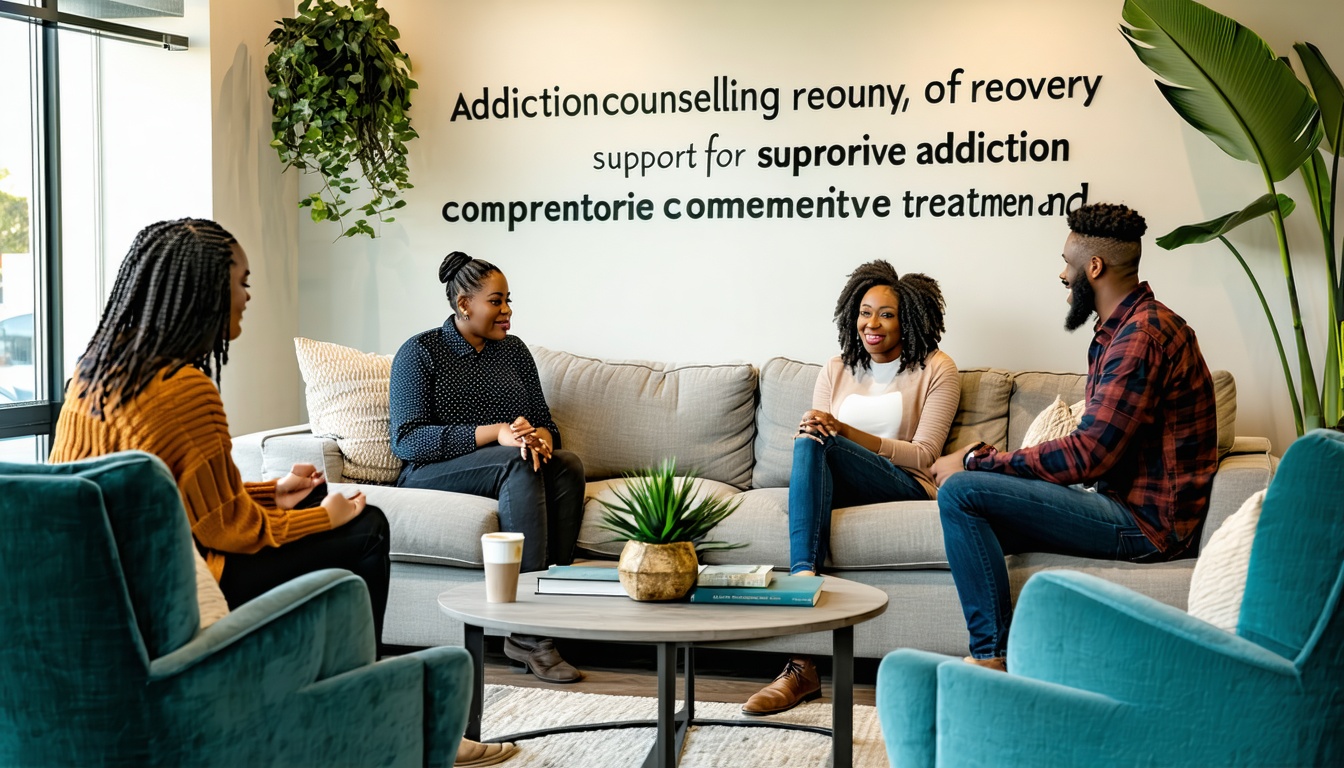Understanding Addiction
Definition and Impact of Addiction
Addiction is defined by the American Society of Addiction Medicine (ASAM) as a chronic brain disorder. It is important to understand that addiction is not merely a lack of willpower or a series of poor decisions. Instead, it involves significant changes in brain chemistry that can result in compulsive behavior despite harmful consequences (Cleveland Clinic). The impact of addiction can be profound, not only affecting the individual but also causing distress within families and communities.
Addiction is recognized as a disease, and addressing it requires compassionate treatment and understanding. People struggling with addiction face a range of challenges, including physical health issues, mental health disorders, and significant social stigma.
| Impact of Addiction | Description |
|---|---|
| Physical Health | Chronic diseases, withdrawal symptoms, and overdose risks |
| Mental Health | Increased anxiety, depression, and co-occurring disorders |
| Social Relationships | Strained relationships with family and friends, isolation |
| Economic Consequences | Job loss, legal issues, and high healthcare costs |
Types of Addictions
Addictions can generally be categorized into two main types: substance addiction and behavioral addiction.
- Substance Addiction: This category includes dependence on various substances, such as:
- Alcohol: The most common addiction, with approximately 10% of people aged 12 or older in the U.S. having alcohol use disorder (Cleveland Clinic).
- Nicotine: Often linked to smoking and tobacco products.
- Marijuana: Increasingly recognized as an addiction due to its psychoactive properties.
- Behavioral Addiction: This embraces compulsive behaviors that negatively impact daily life, such as:
- Gambling addiction: Characterized by the inability to control gambling impulses.
- Shopping addiction: An overwhelming urge to shop that leads to financial and relational issues.
Understanding these different types of addiction can better prepare you or a loved one to seek assistance through addiction counseling, ensuring that the right resources and support are available. If you are looking for effective treatment options, explore our comprehensive list of addiction recovery support groups and resources in Las Vegas to help guide you on the path to recovery.
Treatment Options for Addiction
When seeking help for addiction, understanding the available treatment options is crucial. Effective strategies often involve a combination of counseling, therapy, and medication interventions tailored to individual needs.
Counseling and Therapy
Counseling is a fundamental component of addiction treatment. It provides individuals with the tools to explore the underlying reasons for their substance use while developing new coping strategies. Various therapeutic approaches are employed, including:
-
Cognitive-Behavioral Therapy (CBT): This type of psychotherapy aims to reshape negative thoughts and beliefs, empowering individuals in recovery. CBT sessions often focus on resilience, stress management, and relaxation techniques. It is effective both for mental disorders and addiction (NAATP).
-
Dialectical Behavioral Therapy (DBT): Initially developed for borderline personality disorder, DBT combines traditional CBT techniques with the development of behavioral skills. It has been proven effective in treating addiction alongside various mental health conditions (NAATP).
-
Group Therapy: Participating in group sessions provides support and understanding from peers facing similar challenges. Group counseling encourages sharing experiences, fostering a sense of community that is vital in recovery.
In addition to these therapies, individuals can also benefit from joining support groups like Alcoholics Anonymous or SMART Recovery, which complement the counseling process and promote long-term recovery.
Medication and Interventions
While counseling is vital, medications can also play an essential role in addiction treatment. Your healthcare provider may recommend a combination of medication alongside counseling to address underlying issues.
Commonly used medications in addiction treatment include:
| Medication Type | Purpose |
|---|---|
| Methadone | Used in opioid addiction treatment to help reduce withdrawal symptoms and cravings. |
| Suboxone | Combines buprenorphine and naloxone to treat opioid addiction effectively. |
| Naltrexone | Helps reduce cravings for alcohol and is used in opioid addiction treatment as well. |
| Antidepressants | Address underlying mental health issues such as depression or anxiety that often accompany addiction. |
The combination of therapy and medication can greatly increase the chance of successful recovery. It’s essential to consult with professionals who can create a comprehensive, evidence-based treatment plan, ensuring it’s tailored to individual needs. For more information on addiction recovery options, explore addiction treatment available at local resources like Vegas Stronger.
By providing a range of services including case management and supportive programs, organizations can offer the holistic support required for individuals looking to overcome addiction challenges. If you are exploring treatment for yourself or a loved one, consider reaching out for comprehensive resources and guidance.
Roles in Addiction Treatment
In the field of addiction treatment, various professionals play crucial roles in providing care, support, and guidance. Understanding these roles can help you or your loved one find the appropriate resources for effective recovery.
Addiction Medicine Physicians
Addiction medicine physicians specialize in the prevention, screening, intervention, and treatment of addiction and substance-related disorders. They have the training to recognize and manage co-occurring mental health conditions that often accompany addiction (American Addiction Centers).
These physicians assess patients’ comprehensive needs, which may include formulating personalized treatment plans, prescribing medications, and coordinating with other healthcare professionals to ensure holistic care. Their expertise is vital in navigating complex cases where addiction intersects with mental health issues.
| Responsibilities of Addiction Medicine Physicians |
|---|
| Prevention of substance use disorders |
| Screening and assessment of addiction |
| Developing treatment plans |
| Coordinating care with other professionals |
| Prescribing medication for addiction treatment |
Addiction Nurses and Counselors
Addiction nurses and counselors are essential members of the treatment team, focusing on the direct care of individuals struggling with substance use disorders. Addiction nurses specialize in monitoring patients’ health, administering medications, and providing education about addiction and recovery (American Addiction Centers). Their clinical skills ensure that patients receive medical attention and support throughout their recovery journey.
Addiction counselors, on the other hand, primarily focus on the therapeutic aspects of treatment. They engage clients in behavioral therapies, providing guidance and support to help navigate the recovery process. These counselors often hold specific certifications that reflect their expertise and commitment to helping clients achieve long-term sobriety.
| Roles of Addiction Nurses and Counselors |
|---|
| Administering medications and monitoring health |
| Providing personalized care and support |
| Engaging in counseling and behavioral therapies |
| Educating about recovery and coping strategies |
| Facilitating support groups and community resources |
Both addiction medicine physicians and nursing professionals play a vital role in the continuum of care, ensuring comprehensive treatment and support for those facing addiction. For more information on various treatment options, consider exploring our pages on addiction treatment and drug rehab.
Certification and Credentials
Choosing the right professionals for addiction counseling is crucial for effective support and treatment. Understanding the various certifications and credentials ensures you or your loved ones receive care from qualified individuals.
National Certification and Credentials
National certification for addiction counselors is a standard that helps to ensure the quality and effectiveness of treatment. The National Certification Commission for Addiction Professionals (NCCAP) provides certifications that establish a benchmark of knowledge and skills necessary for professionals in the field. Key certifications include:
| Certification | Description |
|---|---|
| Certified Addiction Counselor (CAC) | A recognized certification that signifies effective training and adherence to best practices in addiction treatment. |
| Master Addiction Counselor (MAC) | An advanced certification for professionals demonstrating significant expertise and experience in addiction counseling. |
Professionals holding these certifications are often trained in various treatment modalities and understand the complexities of addiction management, ensuring that they can provide the most effective support. For a more comprehensive understanding of addiction counseling, you may explore addiction treatment.
State-specific Certifications
In addition to national certifications, many states offer their own specific certifications for addiction counselors. For instance, the Georgia Addiction Counselors Association offers three levels of certification:
| Certification | Requirements |
|---|---|
| Certified Addiction Counselor, Level I (CACI) | High school diploma and completion of basic counseling training. |
| Certified Addiction Counselor, Level II (CACII) | Bachelor’s degree in a related field plus supervised experience in addiction counseling. |
| Certified Master Addiction Counselor (CMAC) | Master’s degree in a counseling-related field and extensive experience in addiction treatment. |
State-specific certifications often have unique requirements that reflect local regulations and standards for addiction counseling. The Alcohol and Drug Abuse Certification Board of Georgia, for example, provides credentials like CADC I, CADC II, and CAADC, which require various educational and supervisory hours (Addiction Counselors).
Having professionals with the appropriate credentials is essential for effective recovery. By opting for certified individuals, you can ensure that the care and support you or your loved one receives adheres to established standards and best practices in addiction counseling. Consider also exploring support services for the homeless and long term recovery support offered by organizations like Vegas Stronger, which are committed to fostering a safe, supportive environment for recovery.
Effective Addiction Treatment Strategies
When seeking effective solutions for addiction, it is crucial to understand the strategies that can lead to successful recovery. Here, we will discuss evidence-based practices and personalized treatment approaches that can significantly enhance addiction counseling and recovery efforts.
Evidence-Based Practices
Evidence-based practices form the foundation of effective addiction treatment programs. These strategies have been validated by extensive research and include various therapeutic techniques designed to help individuals overcome addiction. According to the National Institute on Drug Abuse (NIDA), the following evidence-based methods are commonly utilized:
| Practice | Description |
|---|---|
| Motivational Counseling | Engages clients in the change process by enhancing their motivation to recover. |
| Cognitive-Behavioral Therapy (CBT) | Focuses on reshaping negative thoughts and behaviors to empower the recovery process. |
| Group Therapy | Provides peer support, building a sense of community and shared experiences. |
| Pharmacotherapy | Involves the use of medications to help manage withdrawal symptoms and cravings. |
Utilizing these proven methods increases the chances of a successful recovery from addiction. For specific therapeutic approaches, you might consider cognitive-behavioral therapy, which is effective not only for addiction but also for tackling underlying mental health issues.
Personalized Treatment Approaches
Personalization is a key component of effective addiction treatment. Each individual’s journey through addiction is unique, requiring tailored solutions to address their specific needs. Personalized approaches may include:
- Assessing individual mental health conditions, such as anxiety or depression (anxiety treatment).
- Creating customized recovery plans that reflect personal goals and preferences.
- Incorporating family or social dynamics to enhance support networks.
Additionally, integrating therapeutic modalities like Dialectical Behavioral Therapy (DBT) can be beneficial. DBT focuses on developing behavioral skills and is proven effective in treating both addiction and co-occurring mental health diagnoses (NAATP).
By combining evidence-based practices with personalized approaches, you or your loved one can engage in a more effective recovery process. Comprehensive treatment options offered by resources like Vegas Stronger provide support not only for addiction but also for mental health and homelessness services, thereby addressing the multifaceted nature of recovery. For those looking for ongoing support, the program also includes long-term recovery initiatives such as long term recovery support and addiction recovery support groups.
This approach ensures that you receive the necessary tools and resources to foster enduring recovery and improve your quality of life.
Treatment Settings and Modalities
When considering addiction counseling, understanding the various treatment settings and modalities available can greatly enhance the recovery experience for you or your loved one. Each option presents unique benefits tailored to different needs.
Inpatient vs. Outpatient Treatment
Inpatient Treatment
Inpatient drug rehab offers a structured environment where individuals stay at a treatment facility. This type of setting is particularly beneficial for those with severe or long-term addiction issues. A supportive environment reduces exposure to triggers and facilitates focused recovery efforts. Inpatient programs often provide 24/7 care, including medical supervision and daily therapy sessions.
Outpatient Treatment
Outpatient addiction treatment allows individuals to receive care while living at home. This setting is often suitable for those with milder addiction issues or individuals who have completed an inpatient program. Outpatient treatment can involve counseling sessions at clinics or through home visits. It provides greater flexibility, allowing participants to maintain work or school commitments while receiving essential support.
| Treatment Setting | Key Features |
|---|---|
| Inpatient | – 24/7 supervision – Structured environment – Intensive therapy sessions – Suitable for severe cases |
| Outpatient | – Flexible schedule – Home-based care – Less intensive – Suitable for mild cases |
For a comprehensive look at the advantages of each setting, learn more about addiction treatment.
Therapy Approaches in Addiction Recovery
Various therapeutic approaches are integral to effective addiction recovery. Here are some notable options:
Cognitive Behavioral Therapy (CBT)
CBT focuses on changing negative thought patterns and behaviors associated with substance use. It has shown promising results, with approximately 60% of individuals maintaining recovery for a year or longer after completing 12 to 16 sessions (Right Choice Recovery).
Dialectical Behavior Therapy (DBT)
DBT is effective for treating substance use disorders, yielding a 40% decrease in relapse rates. This approach combines CBT techniques with mindfulness practices and acceptance strategies (Right Choice Recovery).
Rational Emotive Behavior Therapy (REBT)
REBT helps individuals reframe negative thought patterns that contribute to substance misuse. This technique promotes rational thinking, leading to a reported improvement by 60% in recovery rates.
Selecting the right therapy approach is crucial to achieving a successful outcome in addiction counseling. Engaging with addiction recovery support groups can also enhance the recovery experience by providing a community of support.
By understanding the distinctions between inpatient and outpatient treatment and exploring various therapeutic methods, you can make informed decisions about the best path toward recovery, whether for yourself or a loved one.

















